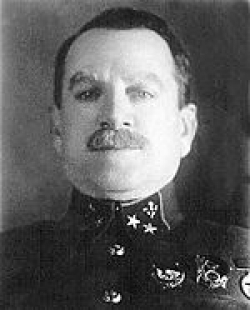Grigorii Zusmanovich was born in 1889 in the small town of Khortitsa in the Ekaterinoslav Province (present-day Zaporozhie Region, Ukraine), into a religious family. His father Moisei was a craftsman. Grigorii completed three years of elementary school in his hometown. Since his family was poor, the boy had to start working, first as a freight handler, and then as a greaser and refinery operator at a mill. When he was 20, Zusmanovich was drafted into the Tsarist army. He saw action in World War I, reaching the highest rank allowed to a Jew, that of senior NCO.
After the February Revolution of 1917, Grigorii Zusmanovich, filled with revolutionary fervor, joined the Red Guard – and, later, the Red Army.
From 1918 to 1925, he held several military posts: being in charge of requisitioning grain from peasants, commanding a rifle division, serving as a commissar in various military districts. In 1926, Zusmanovich completed an advanced course for command personnel at the Moscow Military Academy. Subsequently, he was head of various military administrations.
It is not known whether Zusmanovich managed to avoid Stalin's Great Purge of 1937-1938. According to some sources, he came out of this period unscathed; according to others, he was arrested and tortured by the NKVD, but subsequently released – apparently as part of the so-called "Beria liberalization" of 1939. In any case, he was promoted to the rank of major general in 1940.
When the Soviet-German War began, Zusmanovich was serving as assistant head of the Military-Economic Academy of the Red Army, and could thus stay away from the front lines. Nevertheless, he insisted on being sent to the front. Zusmanovich was appointed commander of the rear of the 6th Army of the Southwestern Front. In September 1941, during the Kiev Operation, Soviet troops were surrounded by Wehrmacht forces. With a group of soldiers, Zusmanovich managed to break out of the encirclement. Subsequently, in the autumn and winter of 1941, he took part in additional operations of the Red Army.
Zusmanovich was severely wounded in the foot and captured during the unsuccessful Red Army offensive near Kharkov, which began in May 1942. Grigorii Zusmanovich is known to have been held in a POW camp in the Ukrainian town of Vladimir-Volynskii in the summer and autumn of 1942. He was then transferred to a POW camp in the Polish city of Chelm, where he was hospitalized for a time. His next place of imprisonment was the German POW camp of Hammelburg. The German military authorities took a great interest in Major General Zusmanovich, offering him to become a collaborator, despite his being a Jew. He refused, and often suffered beatings as a result. Shortly after his refusal, he was transferred to the fortress of Wülzburg, where POWs were being held. There exist different accounts of his death. According to one version, he died of starvation and beatings in Auschwitz in July 1944. Another version claims that he was killed in the Flossenbürg camp in June 1944, after attempting to escape with some other POWs.
Official Soviet war records state that he went missing in action during the fighting for Kharkov in late May 1942.
Excerpts about Zusmanovich from the notes of Soviet military doctor Vladimir Degtiarev
"Among the several hundred sick and wounded prisoners in the "infirmary" of Maidanek were the Soviet generals: D. Karbyshev, T. Novikov, and G. Zusmanovich.
…Some vehicles pulled up at the infirmary blocks. The loading of the sick onto them began. The patients were tossed into the trucks like so many logs of wood. Quite a few of them died from their injuries during the drive to the station. T. I. Novikov and G.M. Zusmanovich, who had protested against the brutal treatment of the sick, were severely beaten by SS men…. On the third day, about noon, the train stopped at a small station. Through the open door, I read [the word] Auschwitz on the facade of an ugly building… The unloading began. Everyone who could move was rushed out of the train cars. One could hear the mad cries of the SS men, the blows of whips, and the barking of dogs. Several minutes later, we saw the lifeless body of Major General Zusmanovich thrown out of the car right onto the ground. We knew that he had been severely beaten on the way….'







